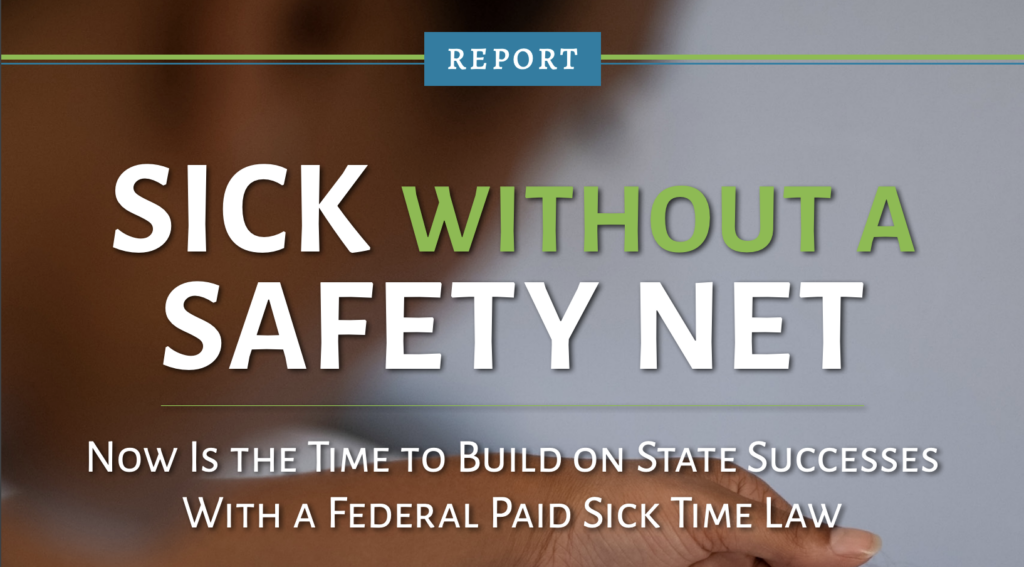Today, national work-family legal advocacy organization A Better Balance released a new report, “Sick without a Safety Net,” that highlights the urgent need for a federal paid sick time law, drawing lessons learned from both the paid sick time laws the organization has successfully passed in dozens of states and localities and its work on emergency paid sick time at the federal, state and local level throughout the COVID-19 crisis.
This report comes on the heels of the White House’s newly released COVID-19 preparedness plan, which reiterates the importance of providing paid leave for workers as our nation continues to navigate a deadly pandemic.
As 33 million workers currently lack access to a single paid sick day, the report concludes that (1) State and local laws are successfully and demonstrably protecting the economic security of families and the health of the public at large, without negative effects on business, and (2) Workers in states without paid sick time are losing out on what should be a fundamental right.
Based on a wealth of existing research and A Better Balance’s firsthand experiences being in touch with workers, business owners, and lawmakers, the report provides the following analysis:
- Paid sick leave is more than a benefit for workers and their families. It also improves public health and boosts the economy overall. And it achieves these benefits without harming businesses. In fact, paid sick leave laws can save employers money by decreasing worker turnover, increasing productivity, and preventing costly and disruptive outbreaks of contagious illness in the workplace. Surveys of business owners in states and localities with paid sick time laws show that workers do not abuse paid sick leave laws, saving their time off instead for when they or their loved ones are ill.
- Stories from workers who have called ABB’s national legal helpline paint a stark image of what it is like to work without the safety net that paid sick leave provides. For example, Delia, who works in a waxing salon in Texas, was exposed to several coworkers who tested positive for COVID-19. At the time, she was 19 weeks pregnant with a high-risk pregnancy. Based on her employer’s policy, she could only receive pay if she tested positive but not if she was exposed, leaving her in the untenable position of having to choose between her pregnancy plus the risk of spreading COVID-19 and her paycheck.
- Jurisdictions with paid sick leave laws are diverse in terms of size and demographics, from Arizona in the Southwest and Colorado and New Mexico in the Mountain West, to the city of Duluth, Minnesota in the Midwest, to Pittsburgh, Pennsylvania and Montgomery County, Maryland in the East. This nationwide paid sick leave movement demonstrates not only the popularity of the policy, but also that paid sick leave works for all kinds of communities across the country.
- Key principles for a federal law include universal coverage, sufficient time off, broad sick time purposes, an inclusive definition of family, strong enforcement, and more.
- With the momentum at the state and local level on paid sick time, public health lessons from the past few years, and the popularity of the issue among voters, Congress has a clear path and mandate to pass the Healthy Families Act, which would for the first time create a permanent, federal right to paid days off from work when sick or caring for a sick loved one.
Some key numbers that can be attributed to the report include:
- According to new research by A Better Balance, approximately 55 million workers have gained a legal right to paid sick time in the past 16 years. The experience of those workers and those states/localities show that they are working well and Congress should look to the success at the state and local level in passing a federal policy.
- 15 states and dozens of localities guarantee workers sick time.
- 18 states create a regulatory vacuum where, despite a lack of federal or state paid leave requirements, localities are prohibited from enacting such policies.
- 11 state and local paid sick time laws use a model, inclusive family definition that allows workers to care for extended relatives and close loved ones who are not biologically or legally related to them, and these laws—including their family definition—have been implemented successfully.
“There has been increasing attention to the need for paid sick leave during the COVID-19 pandemic, but the pandemic merely shines a spotlight on an urgent need that predates COVID-19,” says Sherry Leiwant, Co-President of A Better Balance. “Paid sick leave is a common-sense policy that protects workers, their families, and the economy. With the profound success of these policies in the states for employers and businesses alike, Congress has a clear path and mandate to pass the Healthy Families Act and make paid sick time a permanent federal right.”





